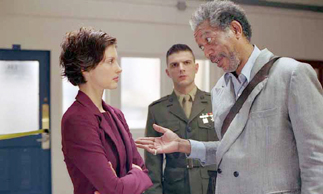Criminal Mischief
High Crimes reneges on its audience
By Cole Smithey

Morgan Freeman showing Ashley some "wild card" tricks.
This review reveals crucial plot points of the film High Crimes. But the movie goes to such great lengths to sucker punch its audience with a false bottom ending that negates the film's dramatic integrity that this review may be a saving grace to any would-be audience member not wanting to be had twice. While Morgan Freeman and Ashley Judd repeat their successful screen chemistry after 1997's Kiss The Girls, the narrative twist that concludes High Crimes comes as a reprehensibly cheap device that perverts the film's previously scathing commentary on the US military and its terribly flawed military court system.
Claire Kubik (Ashley Judd) is a successful San Francisco power attorney working diligently on making a baby with her ideal husband Tom (Jim Caviezel, Thin Red Line) until his shocking Christmas-time arrest by FBI officials turns their world upside-down. It turns out that Tom's real name is Ron Chapman, a former U.S. Marine, and that he's accused of murdering nine civilians in El Salvador 12 years ago.
Claire becomes convinced of her husband's innocence and chooses to defend his case before the Marine military court. Upon meeting her husband's inexperienced military attorney Lt. Embry (Adam Scott ) Claire enlists the help of former ace military attorney Charlie Grimes (Morgan Freeman) as a "wild card" to help free her blameless husband.
It seems that high-ranking military officials have framed Chapman for a slaughter that was actually committed by nut case Major Hernandez (Juan Carlos Hernandez) who, it's revealed, had already carried out the assassination that his troop were sent into the village to complete. Charlie and Claire suffer many brutal acts of intimidation and surveillance by military forces while trying everything under the sun to win in a court system where every outcome is decided in advance. The film's message is clear: the US military court system and the US military itself is a despicably corrupt organization acting impudently within its own heavily protected layers of bureaucracy. Got it.
Even with sophisticated civilian and military attorneys, it's manifest that justice could never be served in this ridiculous kangaroo court.
As the trial nears its end, an attempt to murder Charlie and Claire by unseen forces extends the pressure against the defense beyond the pale of simple lawlessness, and into the realm of attempted civilian assassination by its own government. At this point the audience has been worked into a frenzy of loathing for the US military by the film's use of heavily skewed narrative equivocation. You can firmly sense how effective cinema is as an exploitation device.
By an implausible turn of events, Claire - having suffered unspeakable physical toll - somehow accomplishes what none of us in the audience could ever hope to do against such odds: she's beaten the corrupt US military system.
But not so fast: the filmmakers couldn't really let you leave the theater thinking that the US military system is so immoral, or that Claire could be so favored against those all-knowing tough guys in uniform.
No, because it turns out, nothing is really what she thought it was.
Sure, because that way the filmmakers get the double payday of pandering out another good ole Hollywood surprise climax while gallantly retracting any bad intentions they might have paraded against the US military over the course of the movie.
I've never seen anything like it in the more than 4000 movies I've seen and I hope I never see it again.
Just as William S. Burroughs revealed over 30-years ago; "nothing is true, everything is permitted."